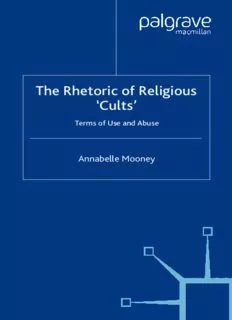
The Rhetoric of Religious ‘Cults’: Terms of Use and Abuse PDF
Preview The Rhetoric of Religious ‘Cults’: Terms of Use and Abuse
The Rhetoric of Religious ‘Cults’ Terms of Use and Abuse Annabelle Mooney The Rhetoric of Religious ‘Cults’ This page intentionally left blank The Rhetoric of Religious ‘Cults’ Terms of Use and Abuse Annabelle Mooney Centre for Language and Communication Research Cardiff University, UK © Annabelle Mooney 2005 Softcover reprint of the hardcover 1st edition 2005 978-1-4039-4285-2 All rights reserved.No reproduction,copy or transmission of this publication may be made without written permission. No paragraph of this publication may be reproduced,copied or transmitted save with written permission or in accordance with the provisions of the Copyright,Designs and Patents Act 1988,or under the terms of any licence permitting limited copying issued by the Copyright Licensing Agency,90 Tottenham Court Road,London W1T 4LP. Any person who does any unauthorised act in relation to this publication may be liable to criminal prosecution and civil claims for damages. The author has asserted her right to be identified as the author of this work in accordance with the Copyright, Designs and Patents Act 1988. First published in 2005 by PALGRAVE MACMILLAN Houndmills,Basingstoke,Hampshire RG21 6XS and 175 Fifth Avenue,New York,N.Y.10010 Companies and representatives throughout the world. PALGRAVE MACMILLAN is the global academic imprint of the Palgrave Macmillan division of St.Martin’s Press,LLC and of Palgrave Macmillan Ltd. Macmillan® is a registered trademark in the United States,United Kingdom and other countries.Palgrave is a registered trademark in the European Union and other countries. ISBN 978-1-349-52168-5 ISBN 978-0-230-50441-7 (eBook) DOI 10.1057/9780230504417 This book is printed on paper suitable for recycling and made from fully managed and sustained forest sources. A catalogue record for this book is available from the British Library. Library of Congress Cataloging-in-Publication Data Mooney,Annabelle,1974– The rhetoric of religious ‘cults’:terms of use and abuse / Annabelle Mooney. p.cm. Includes bibliographical references and index. 1.Cults.I.Title. BP603.M664 2005 209—dc22 2005042521 10 9 8 7 6 5 4 3 2 1 14 13 12 11 10 09 08 07 06 05 ‘For us, there is only the trying. The rest is not our business’ T.S. Eliot, ‘East Coker’ in The Four Quartets This page intentionally left blank Contents Acknowledgements ix 1 Introduction 1 Outline 3 Why this matters 5 2 The ‘Cults’ and the Canons 10 Which ‘cults’ and which texts? 10 Framework 15 Rhetorical canons 18 3 The Church of Scientology 41 Background 41 ‘The Story of Dianetics and Scientology’ 43 Conclusion 71 4 The Jehovah’s Witnesses 72 Background 72 A Book for All People 75 Conclusion 103 5 The Family 105 Background 105 ‘The Big Lie! – Exposed!’ 109 Conclusion 128 6 Is ‘Cult’ Language Distinctive? 129 Memory 130 Delivery 137 Arrangement 140 Invention 144 Style 147 7 ‘Cults’: What They Are 155 Definition of ‘cult’ 155 Definition part II 162 vii viii Contents 8 Cults, Cults Everywhere? 169 Memory 169 Delivery 170 Arrangement 171 Invention 172 Style 174 Conclusion: McKinsey as Cult? 177 Notes 182 Bibliography 191 Index 205 Acknowledgements I should like to thank The Watch Tower and Bible Tract Society who generously granted permission to use extracts from A Book for All People. Likewise, thanks to World Services, for kindly granting permission to use extracts from ‘The Big Lie! – Exposed!’ by David Berg, first published in 1977. Thanks also to Faber and Faber (UK) and Harcourt Inc (USA) forpermission to quote an excerpt from T.S. Eliot’s ‘East Coker’ (in Four Quartets, © 1940 by T.S. Eliot and renewed in 1968 by Esme Valerie Eliot). In London, Catalyst, Deo Gloria Outreach, and INFORM, all provided access to their extensive collection of materials which was so very valu- able in the early stages of this research, as well as providing agreat vari- ety of personal contacts and seminars. Maintaining such records might usually be a thankless task; it is extremely important and it is done with dedication and expertise. Every effort has been made to trace all copyright holders, but if any have been inadvertently overlooked, the publisher will be pleased to make the necessary arrangements at the first opportunity. There are a great number of people who deserve thanks and without whom this book would not have been written. I mention specifically those involved for extensive periods; though my thanks go to everyone who engaged with me about these issues. The initial (and major) part of this work took place in Glasgow. Professor Christian Kay and Dr Catherine Emmott have been tireless in their support as have all at Department of English Language at the University of Glasgow. I should also like to thank Professor Rom Harré and Dr John Corbett for their extremely incisive and valuable comments. My colleagues at the School of Law, especially Professor McLean and Ms McGuire were of supreme importance in many ways. Jill Lake’s initial enthusiasm for the project and her subsequent patience are very much appreciated. In addition, I should like to thank Professor Theo van Leeuwen, Dr Miriam Young, Ms Isobel Scott, Dr Betsy Evans, Dr Noel Heather, and my colleagues at Cardiff University. Special thanks are due to Dr Christopher Marlow for careful reading of the MS while in preparation (and general handholding). Naturally all errors are my own. This is for my family. ix
Description: